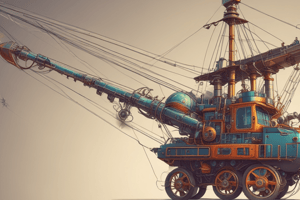Podcast
Questions and Answers
What is the definition of simple machines?
What is the definition of simple machines?
Basic devices that make it easier for us to perform physical tasks, typically made up of one or a few parts, and they harness the forces of nature.
How do wheels and axles transform motion?
How do wheels and axles transform motion?
They transform rotational motion into linear motion.
Name one common example of a simple machine.
Name one common example of a simple machine.
Levers
What is the function of pulleys?
What is the function of pulleys?
What is the function of screws?
What is the function of screws?
How have simple machines contributed to shaping human history?
How have simple machines contributed to shaping human history?
What are inclined planes used for?
What are inclined planes used for?
Name one application of simple machines in agriculture.
Name one application of simple machines in agriculture.
How have simple machines impacted manufacturing processes?
How have simple machines impacted manufacturing processes?
What is one type of mechanical device that utilizes simple machines?
What is one type of mechanical device that utilizes simple machines?
Study Notes
Title: Unraveling the Wonders of Science: A Journey through Simple Machines
Introduction
Science, a broad and intriguing discipline, encompasses the study of the natural world and our attempts to understand and explain reality. One of its most fundamental and fascinating aspects is the exploration of simple machines, which have captivated our curiosity and shaped human civilization for centuries. In this article, we will delve into the exciting world of science by focusing on simple machines and their transformative impact on our day-to-day lives.
What are Simple Machines?
Simple machines, also known as primary or elementary machines, are basic devices that make it easier for us to perform physical tasks. They are typically made up of one or a few parts, they harness the forces of nature, and they directly convert energy from one form to another. Some common examples of simple machines include:
- Levers - Levers are among the most widely recognized simple machines. They work by pivoting a rigid bar around a fixed point called a fulcrum.
- Wheels and Axles - Wheels and axles transform rotational motion into linear motion. They are used in various applications, such as automobiles, bikes, and carts.
- Pulleys - Pulleys are wheels with a groove that allows a rope or cable to pass through it. They help to transmit force and to change the direction of mechanical power.
- Inclined planes - Inclined planes are ramps that reduce the effort required to lift a load. They are often found in staircases, construction sites, and roadways.
- Screws - Screws, also known as helices, are long, threaded rods that convert rotational motion into linear motion. They are used in fasteners, screwdrivers, and screw compressors.
The Importance of Simple Machines
Simple machines have played a crucial role in shaping human history by:
- Easing labor - Simple machines make it easier for us to lift, move, and process objects. They decrease the amount of physical effort required for various tasks, thereby saving energy and time.
- Improving efficiency - Simple machines help us to perform tasks more effectively by transforming energy from one form to another.
- Facilitating communication - Simple machines have greatly contributed to the development of communication systems, such as tools for writing, printing, and telecommunication.
- Promoting innovation - Simple machines have inspired the development of more complex and advanced machines, such as steam engines, automobiles, and airplanes.
Applications of Simple Machines
Simple machines are used in a wide range of applications, such as:
- Mechanical devices - Simple machines are fundamental components of mechanical devices, such as cranes, elevators, and automobiles.
- Electrical devices - Simple machines have inspired the development of electrical devices, including motors, generators, and transformers.
- Agriculture - Simple machines, such as plows, combine harvesters, and irrigation systems, have greatly improved agricultural practices.
- Construction - Simple machines have played a vital role in the development of construction techniques, such as earth-moving equipment and building materials.
- Manufacturing - Simple machines have contributed to the development of manufacturing processes, such as assembly lines and robotics.
Conclusion
Simple machines have significantly shaped human civilization by easing labor, improving efficiency, facilitating communication, and promoting innovation. Understanding simple machines is fundamental to gaining an appreciation for the marvels of science. As we continue to explore and unravel the mysteries of the natural world, it is essential to recognize the incredible impact of simple machines on our daily lives. By doing so, we can better understand the importance of science and its undeniable impact on our global society.
Studying That Suits You
Use AI to generate personalized quizzes and flashcards to suit your learning preferences.
Description
Test your knowledge of simple machines with this quiz, which covers the fundamental concepts, importance, and applications of these basic devices. From levers and pulleys to screws and inclined planes, this quiz will challenge your understanding of the transformative impact of simple machines on human civilization and everyday life.




